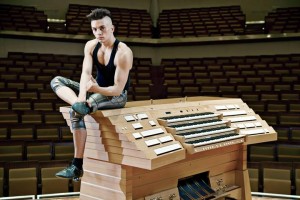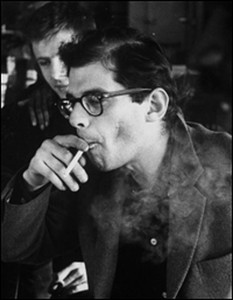Organ virtuoso Cameron Carpenter performed at my university last night, where I had the pleasure of hearing and seeing him for the first time. His punk elegance (soft Mohawk), genderbending attire (extended grey cowl-neck tunic, black leather pants), and dancing shoes (near-Rumpelstiltskin toes, rhinestone heels) announced Carpenter’s defiance of categories–including music, gender, and genre. He plays two-footed with one foot. He plucks keys as if they were strings.  He pumps expression pedals like they were bellows keeping the console alive. Lithe as Ian Curtis but with musculature, long-fingered as Edith Sitwell but without rings, he brings a sensibility to the organ that is as literary as it is musical. His stage talk puns on the Grimm tales and quotes from Lawrence Durrell’s Justine. He posts about Dorian Gray Wednesdays at the Bowery Electric. If the pipe organ has a longstanding “struggle to find its identity,” as Carpenter claims, the performer-composer has crafted and stage-managed an outlier identity. Here’s a recent photo of Carpenter from his Facebook Timeline.
He pumps expression pedals like they were bellows keeping the console alive. Lithe as Ian Curtis but with musculature, long-fingered as Edith Sitwell but without rings, he brings a sensibility to the organ that is as literary as it is musical. His stage talk puns on the Grimm tales and quotes from Lawrence Durrell’s Justine. He posts about Dorian Gray Wednesdays at the Bowery Electric. If the pipe organ has a longstanding “struggle to find its identity,” as Carpenter claims, the performer-composer has crafted and stage-managed an outlier identity. Here’s a recent photo of Carpenter from his Facebook Timeline.
I studied classical organ music in my teens, and have always found it to be a fundamentally mind-expanding experience (as well as an aesthetic and emotional one). Allen Ginsberg apparently felt likewise, including “Transcription of Organ Music” in his 1956 landmark collection Howl and Other Poems. Musical transcriptions reinvent a composition for another instrument, migrating the sounds to new tonalities and possibilities. (Last night, Carpenter performed his transcriptions of piano and orchestral music, including a film score.) Ginsberg migrates the expansiveness of organ music to spaces of domestic confinement: “I began to feel my misery in pallet on floor, listening to music, my misery, that’s why I want to sing.” Through the electric current powering his phonograph (it’s a Bach LP in Ginsberg’s recording), organ music flows into the formerly bereft domicile– opening it to the light and enlightening the speaker: “I want people to bow as they see me and say he is gifted with poetry, he has seen the presence of the Creator.” (Like a Ginsberg poem, Carpenter’s astonishing rendition of Marcel Dupré’s “Noël Nouvelet” variations was profanely divine.) Could organ music be part of the same illumination aesthetic we find in Howl–a revolutionary poem known for sounding a new Beat masculinity through jazz music? After all, Ginsberg saw what Carpenter calls “the sexy side of Bach.” -MB
opening it to the light and enlightening the speaker: “I want people to bow as they see me and say he is gifted with poetry, he has seen the presence of the Creator.” (Like a Ginsberg poem, Carpenter’s astonishing rendition of Marcel Dupré’s “Noël Nouvelet” variations was profanely divine.) Could organ music be part of the same illumination aesthetic we find in Howl–a revolutionary poem known for sounding a new Beat masculinity through jazz music? After all, Ginsberg saw what Carpenter calls “the sexy side of Bach.” -MB
,